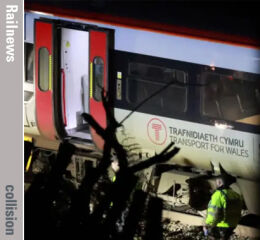Posted 5th November 2024 | 1 Comment
Welsh train in fatal collision had blocked sanders

Accident investigators have confirmed that the fatal head-on collision on the Cambrian line in mid-Wales on 21 October was caused by wheel slip, and that although the driver of the affected train made an emergency brake application the automatic sanders which should have been triggered by the slipping wheels were blocked.
The train concerned, 1J25 from Shrewsbury to Aberystwyth, continued through the passing loop at Talerddig in Powys and collided on a descending gradient with train 1S71 from Machynlleth to Shrewsbury.
One passenger died and four others were seriously injured. Eleven more also needed hospital treatment for their injuries.
The Rail Accident Investigation Branch says although neither train was derailed, ‘significant damage’ was caused to the leading vehicles.
The trains were formed of two-car Class 158 units, operated and maintained by Transport for Wales. They were removed on 25 October, and the line reopened on 28 October.
The RAIB said: ‘Initial analysis of data from the on-train data recorder fitted to train 1J25 shows that the driver applied service braking to slow the train as it neared the loop at Talerddig.
‘Around 40 seconds after the first service brake application, the OTDR records an emergency brake demand being made. This emergency brake demand remained in place until the collision. OTDR data shows that wheel slide started during service braking and was constant during emergency braking.
‘Train 1J25 then entered the loop at Talerddig. Although the train slowed while passing through the loop, it did not stop before passing the block marker near the exit.
‘There is conflicting evidence relating to the speed of the trains at the point of collision. Initial analysis indicates that train 1J25 was travelling at between 24 km/h (15 mph) and 39 km/h (24 mph), while train 1S71 was travelling at around 10 km/h (6 mph) in the opposite direction.’
The RAIB’s inquiry is continuing.
If defective sanders were a cause of the collision, it will not be the first time that a driver has lost control for this reason.
A Southeastern train ran through Stonegate station on 8 November 2010 and continued out of control for more than four kilometres before stopping. There was no collision and no one was injured, but the RAIB identified ‘poor adhesion conditions’, and said the leading sand hoppers were ‘almost certainly empty’.
Reader Comments:
Views expressed in submitted comments are that of the author, and not necessarily shared by Railnews.

Tony Pearce, Reading
I had a discussion with one of the drivers of similar units. He told me that not all 158s were fitted with sanders when built and some had been fitted later on in their lives. He also said that the 158s had 'one shot' sanders, so that if used once in a Journey they would have nothing left for another emergency application. I wonder if Railnews can confirm or deny his comments, as they were made just after the Salisbury collision, and things might have changed.
[No, unfortunately. Such a question should be directed to the RAIB.--Ed.]